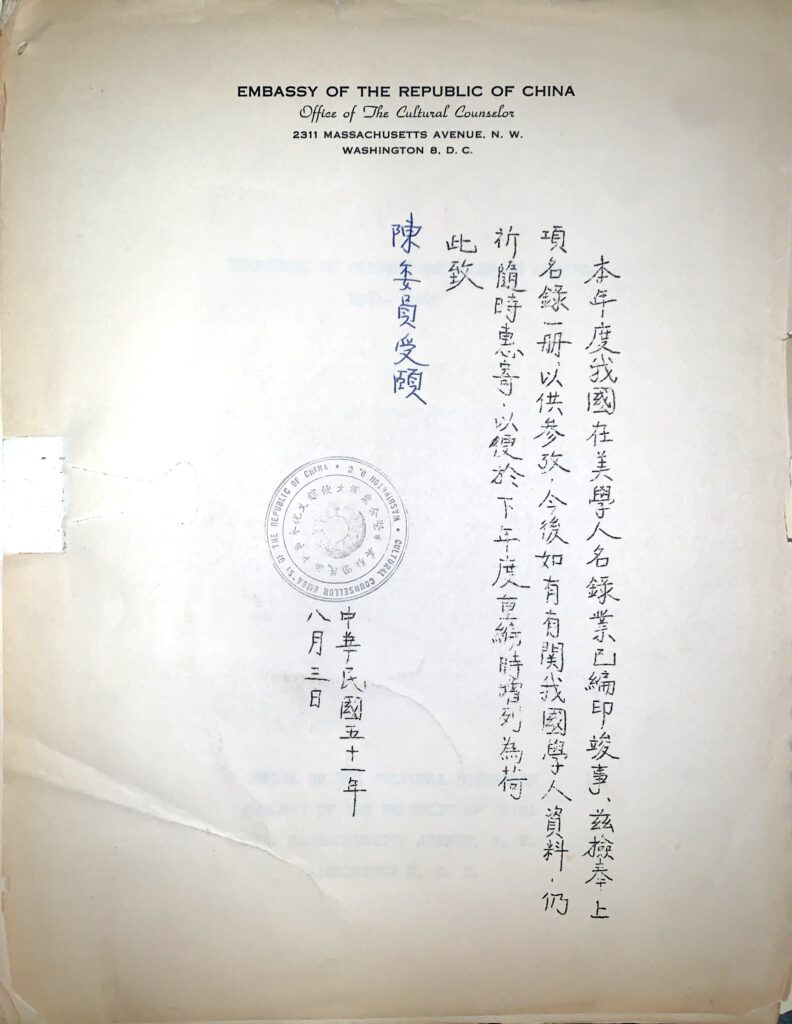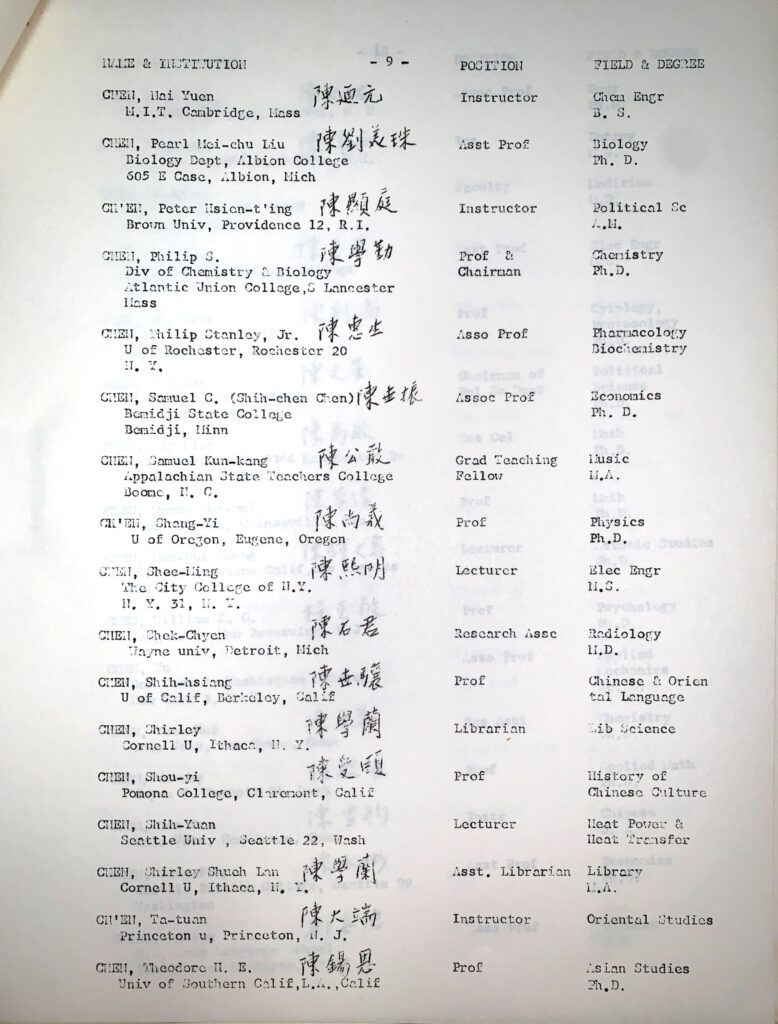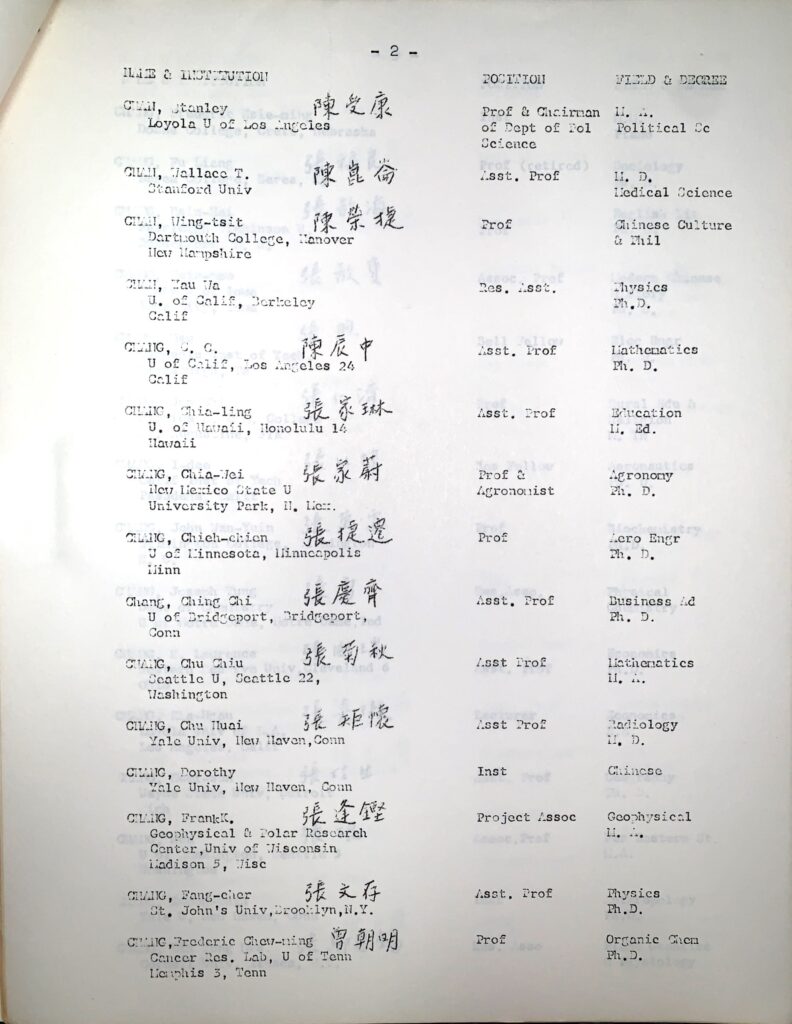This week when I was processing Ch’en Shou-yi’s materials, I found a governmental document, Directory of Chinese Scholars in America, 1961-1962, which was published by the Office of the Cultural Counselor, ROC Taiwan. As a Chinese scholar in the US, Ch’en received a copy with a gift note. The note disclosed some important information. First, Ch’en was not addressed as Doctor or Professor, but as a Committee Member, which meant that Ch’en must be a member of the committee in charge of the compilation of the directory. Second, Ch’en was asked to update the committee with the latest information of Chinese scholars in the US, indicating that Ch’en might have participated in gathering information about Chinese scholars in the US, or simply due to the fact that Ch’en had a wide academic circle. Indeed, from this document, we find many familiar names such as Chan Wing-tsit, Lin Yu-tang, and Chao Yen Ren that we introduced in the past weeks, making this document a useful index for Ch’en Shou-yi Papers.

First, this document listed Ch’en’s family and friends teaching at colleges. Ch’en’s two younger brothers, Chan, Shau-wing (陳受榮) and Chan, Stanley (陳受康) were scholars at Stanford University (p. 1) and Loyola University of Los Angeles (p. 2). Ch’en’s materials contain his correspondence with his brothers and an offprint written by Stanley Chan. Chan, Wing-tsit (陳 榮 捷 ) was Ch’en’s friend, fellow alumnus from Lingnan University, and colleague at the University of Hawaii. Chan and Ch’en established the Oriental Institute together (page 2). The Ch’en Shou-yi Papers include quite a few of Chan’s offprints, correspondence, and notes on Lingnan University. Liu, Wu-chi (柳無忌), professor at Indiana University (p. 52), focused on Chinese literature, especially modern Chinese writer and artist, Su Manshu (蘇曼殊). Liu was a friend of Ch’en and H. M. Lo (羅孝明), a Chinese scholar who also studied Su Manshu in Japan. Ch’en’s materials include correspondence among Ch’en, Liu, and Lo.

Second, this document listed Chinese studies scholars who benefited from Ch’en’s teaching or mentoring. Chu, Wen-Djang (朱文長), one of Ch’en’s students, was an instructor at Yale University (p. 20). Ch’en received Chu’s offprints of his latest worksand letters on Chu’s career in Singapore. Chuan, Han-sheng (全漢昇) was a visiting professor at University of Chicago (p. 20). Chuan was Ch’en’s student and became a well-known scholar for history of Chinese economics. Ch’en’s materials included Chuan’s offprints and handwritten notes on Ch’en’s lecture at Peking University.
Finally, this document listed some scholars who were not teaching or researching at colleges such as Ch’en’s old friends, Lin, Yu-tang (林語堂) and Yuan, T. L. (袁同禮). Both of them made contributions to modern Chinese literature and library science. The Ch’en Shou-yi Papers include Lin and Yuan’s photos, offprints, and correspondence. In addition, Chao, Yen Ren (趙元任), an important founder of modern Chinese linguistics, retired from University of California, Berkeley (page 6). Chao maintained a close relationship with Ch’en and Hu Shih. Chen’s materials preserve Chao’s correspondence and offprints.
